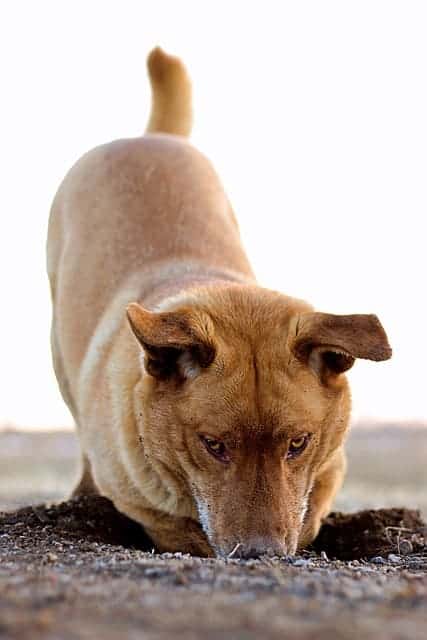
Although it is a completely domesticated species, sometimes dogs exhibit behaviors that they inherited from their ancestors. Burying food is one of them.
Have you ever wondered why dogs bury their food? From the point of view of us humans this is a behavior that does not seem to make much sense, since domestic dogs always have food available, a fact that they certainly “cannot ignore”.
The main reason for this kind of conduct lies in the vestigial traits inherited from one’s ancestors. It is not only dogs that present these residual characteristics: a well-known example is that of the presence of wisdom teeth in a high percentage of human beings on earth.
Canine domestication and their ancestors
To understand this type of behavior, it is necessary to go back along the phylogenetic tree and the evolutionary history of the domestic dog.
Some genetic studies have tried to shed light on the past of the dogs that accompany us today. To our surprise, present day wolves and domestic dogs constitute two mutually monophyletic or, in other words, clearly distinct groups.
This fact means that the domestic dog is not genetically close to any current wolf population and that, as a result, their common ancestor (probably some kind of Pleistocene wolf) is now extinct.
Why is it necessary to report this type of evolutionary relationship? It serves to clarify that, in many cases, we do not need to refer to the wolf to discover the reasons that determine the behavior of domestic dogs. In any case, it would be necessary to conduct a study on the characteristics of their common ancestor, which has long since disappeared.
Why do dogs bury their own food?
Resource procurement is vestigial behavior, born in response to a habitat where food is scarce.
In English, this term is known as surplus killing and is present in numerous mammals, including polar bears, lynxes, foxes, killer whales, coyotes, raccoons and, of course, the domestic dog.
Food hoarding behavior has also been observed in packs of wild wolves, which bury their prey under the snow, where the meat can be kept for days or weeks. It is an evolutionary mechanism that is easy to understand, because it responds to the need to guarantee food.
It is very interesting to know that this habit of burying excess food also manifests itself according to the breed of the dog. For example, dogs that have been genetically selected for hunting appear to exhibit a greater tendency than dogs that have been trained for sport.
It is hypothesized that this group of hunters manifest their “predatory instinct” day by day; consequently, it makes perfect sense that vestigial behaviors such as the aforementioned surplus killing are more present.
For this reason, dogs belonging to the Dachshund, Beagle, Basset Hound and Miniature Schnauzer breeds are more likely to dig holes when they receive a reward.
Animals that have a full stomach can set aside food for times when food is scarce.
Dogs burying food: what to do?
Undoubtedly, cracking down on a dog for vestigial behavior imprinted in its genetic code doesn’t make much sense. The trick to avoiding this kind of conduct is to channel your business in another way.
For example, it is possible to allow a space formed by blankets or pillows in which the dog can bury their toys and valuables. Another solution could be to offer the dog a box of earth reserved for him, in which he can dig holes without ruining the garden of his guardian.
Boredom can also be an important factor affecting this behavior. If the brace provides the dog with sufficient stimulation, it is possible that the latter does not have to resort to their most instinctive part, to channel his energies. For this reason, toys always represent a good solution to behavior problems.
Finally, it is also advised not to give bones or snacks to dogs when they have a full stomach. In this way we will avoid that the animal interprets these elements as “excess food” and its desire to keep them underground will be reduced.
A hereditary but positive behavior

As we have seen, the reason dogs bury their food is completely normal and responds to a vestigial evolutionary trait. However, as long as it does not turn into an obsession, repressing the dog for displaying their most basic instincts could be counterproductive.
It is necessary to remember that dogs need environmental enrichment and toys that enhance their instincts, as well as activities that stimulate the sense of smell. Allowing the dog to occasionally come into contact with their most ancestral “I” is necessary for their happiness.






